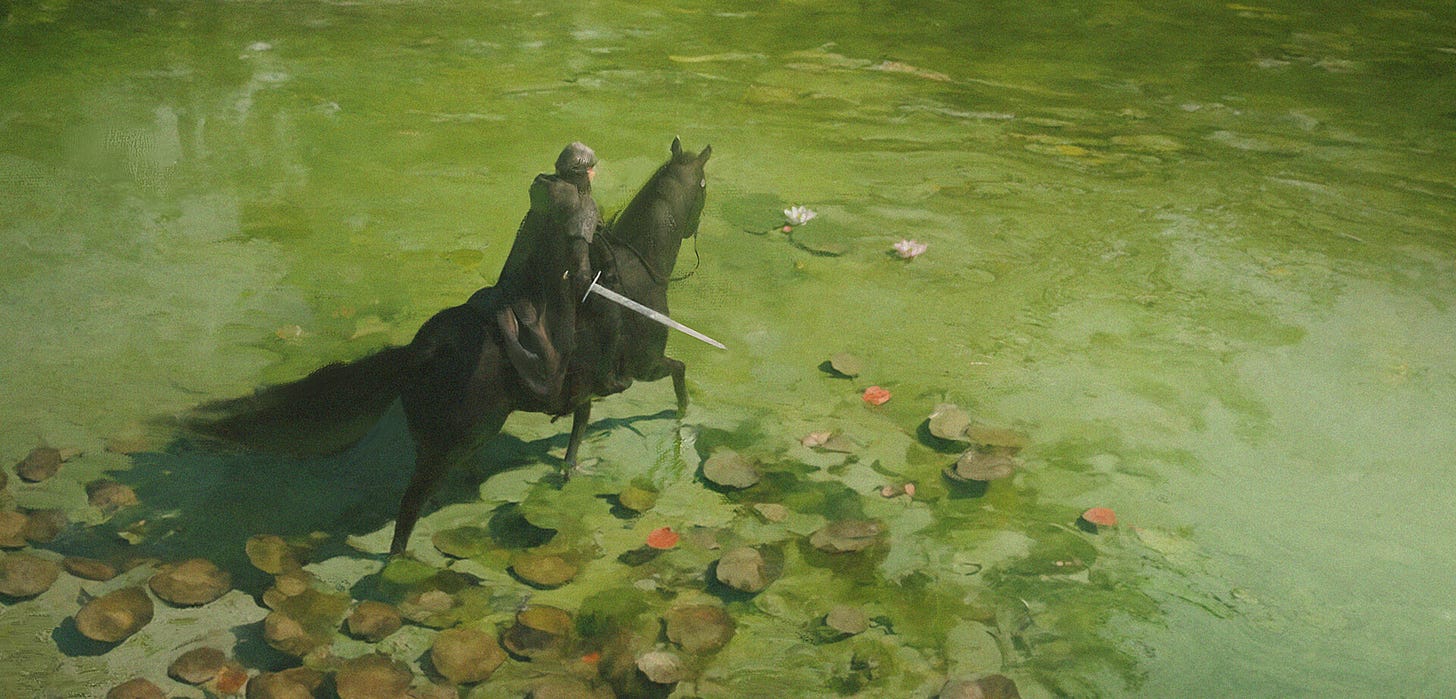✹ ✹ ✹
Jehan was a poor man, and poverty had aged his body and heart more rapidly than time alone. He was barely into his fourth decade, yet he felt closer to the grave than the cradle. His body had long been ailed by the insufficient sustenance that his wages could afford, meager and inconsistent as they were.
So when the knight appeared in his battle-raiment, Jehan was afraid. He felt his bowels twinge and his stomach twist.
Jehan had been stooping among the tree-roots along the road, hoping to find mushrooms or wild herbs, but a thunder of hooves had announced a rider: a knight atop his steed, alone, but spurring his warhorse forward in a fury.
It only took an instant for the peasant to understand the threat; the warhorse and the mail were terrifying enough, but the drawn sword and bloodied brow sent panic down Jehan’s spine. In the back of his mind, Jehan registered the colors that the rider wore—the blue and white of Arlemón; this man was an outlander, one of the Duke’s men. An enemy.
His feet were already running.
The pauper flew through the underbrush and towards the mud-and-bough hovel he and his family called home. Smoke trickled through up through its hole. Was his wife within, or—Words preserve them all—his daughter?
Jehan burst through the thin curtain that was their door. Blinded in the dark, he spoke into the shadows:
“Teline! Where is Aalis?”
“What is wrong?” snapped the mother, just as the teenage daughter said:
“I am here!”
Jehan grabbed at his daughter’s shoulders. “We must hide you, now!”
There was a claustrophobic scramble as the three bodies twisted around each other in the tiny hut. Questions abounded and Jehan did his best to explain, even as he shoved his girl under the nest-like structure that these peasants called a bed.
Not a moment too soon. The thunder outside had gotten louder, then slowed, and stopped just outside. The horse snorted. Feet landed in the grass. Footfalls came closer.
A blade’s point poked past the edge of the curtain door and whipped the cloth aside. Light poured into the hovel, but for a heartbeat only; a silhouette blotted it out. It was a man so large that he had bent himself nearly in half just to peer within.
The invader regarded the couple: a weak man, a woman of indeterminable age, and the rank smell of privation.
And what did the peasants see in return? A sword shining in the sun, except where the blade was bloodied. A hard face, with yet more blood on its brow. Below it, a tunic of white and red with the blazing blue shell of Arlemón. This device told the cowering couple the story: the blood on the blade belonged to the knights and soldiers of Guiffard, their protectors.
A question struck from outside: “Do you have water?”
Jehan’s jaw opened, shivered, shut.
“Water, man!” the knight boomed. “Do you have it?”
“Yes! Sir, yes! Outside, sir!”
“Have your woman bring me some.”
Teline took her shaking hands from her husband’s arm and shuffled towards the door. Her eyes watched the ground as she slid past the knight’s blade and out of the hut. The knight kept his sword out in front of him as he slowly entered in his place.
Jehan found himself against the far wall of his hut—not that it was far at all. As the knight entered and looked around, he could have merely extended his arm and shot his blade through the intervening space, through Jehan’s chest, and likely through the wall itself without even moving his feet. So close was death. The knight peered around, and finding no threat—for where could any threat hide in such a mouse-hole of a home?—he entered fully. He was too tall for the ceiling.
The man lowered himself to sit on the grassy bed. There was a squeak; Jehan knew it as his daughter’s frightened squeal, but the knight did not seem to notice.
“My lord, sir, is there—”
“Quiet.”
Jehan shut his teeth.
Teline returned with a bowl of water. At last the knight lowered his sword, and when its edge touched the ground the whole weapon tumbled from the man’s grasp. He reached out to the bowl with two hands like a babe for its mother. He brought the bowl to his lips, drank and—
“Fwoh!”—he spat out the first mouthful with a baleful look at the indigents before him. He looked back at the bowl of water, then again at his hosts, revaluated his wrath, then went to drink again. The world inside the hut waited until the bowl was drained down the man’s gullet.
“More.” The knight held out the bowl. The woman disappeared a second time. In the interim, the man lifted his weapon to inspect it. He put its point in the dirt and looked down the edge.
Teline came back and the knight told her to put the bowl on the ground. She then retreated back beyond the stone-still Jehan. They watched as the intruder put a hand into the bowl, drizzled some water from it onto his sword, and slowly worked it down the metal with his fingers. He did this several times. Then he shook his fingers, flicking water and gore onto the dirt beneath him. He reached behind him and found a bundle of cloth.
“My shirt,” Teline whispered.
“Quiet,” said Jehan.
The knight dipped the ragged thing into the water and began to clean his blade with more vigor.
“My lord?” Jehan ventured. The knight’s eyes glanced up at him, but quickly went back to his work. The pauper spoke again: “My lord, sir, we heard rumor of battle.”
“It is no rumor.”
“My lord, how did the battle fare?”
“What would you know of such things?” came the rebuke.
Jehan decided on a different tactic. The shock of this man’s arrival had begun to wear off, and so he forced his feet forward. He bent down and gathered another rag from the family’s one basket; he dipped it in the bowl and held it up towards the knight’s head.
“Your brow, m’lord. Will you let me clean it?”
The knight reached a hand up to his hairline, confused. He felt the sting of his cut, bringing his hand away again to see the blood.
“Very well,” he said.
Jehan dabbed the cloth on the wound. An uncomfortable silence endured as the pauper wiped the invader’s forehead and cheek. The intruder’s grip on his sword tightened, his body poised for treachery.
At last Jehan broke away. The knight put a hand up again and saw it came away without blood—it could not be said that the hand was clean, for it was still covered in the sweat and dirt and the grime from the rag’s work. But the knight seemed satisfied. At a jerk of his head Jehan retreated back to the other side of the hut.
The knight dragged his cleaning-cloth over his blade one final time. He started to sheath the weapon, but stopped. Instead, he placed the blade across his lap and began to unfasten his belt. He unroped the belt from his waist, then untangled the straps and buckles that secured his scabbard to the leather.
He put the belt beside him, put the sword into its scabbard, rested it on his lap again, then hoisted the belt up before the peasants, now devoid of its blade and sheath.
“See these?” he pointed to the metal buttons than decorated the leather most of the way down the belt. “These are silver. Real silver.” Then he tossed the belt down at Jehan’s feet. The knight stood up. He had to stoop under the hovel’s ceiling, and his presence filled the room.
“The battle,” he said, “did not fare well for us. Your count fought well; the Guiffards and their men had the better of us. The site it not far, a mile down that path, maybe less. Whenever you sell that,” he pointed to the belt, “just tell them you looted it from the dead. Our sport is over, and that grim task will no doubt begin by nightfall.
“In exchange, I ask one thing: there will be men coming this way. Do not tell them I was here, and do not tell them where I have gone. Can I trust you in this?”
Jehan spread his hands. “Sir, why would anyone ask? We are of little consequence.”
“Should you betray me to my death, I would not think it so.”
“We will not betray you, lord. Not with this kindly gift, sir. Your generosity is—”
The knight held up a hand. “It is enough. But before my enemies come, I suggest you bury that trinket elsewhere. They will look for such things, and it will not be enough to hide it under the bed with your daughter.”
Jehan choked. There was another squeak from within the pile of straw and rags.
With that, the knight disappeared through the door.
Jehan blinked—the tightness that had gripped his chest since the hoofbeats had fallen upon his ears had now suddenly lifted. Relief washed over him. He ran out the door.
At first he thought the knight had gone, but then he saw that the warhorse had wandered over to their water basin and drained it of its rainwater. The knight was atop his saddle again, stroking the beast’s neck with one hand, the other holding his sheathed sword.
“My lord,” Jehan said, “I must thank you.”
“I am not your lord,” said the knight, “but I will be! Only once I have my retribution for Guarin Guiffard’s handiwork today. And believe me, little man. I will have it. I will.” Jehan did not understand these words, nor the vehemence that had suddenly flared in the knight’s voice. Before he could make sense of them, the rider spun his horse away and began a canter towards the woods.
And so Rolant Onscarid, Duke of Arlemón, began the long and treacherous journey home, to the Free City beside the Sea.
✹ ✹ ✹
Want More?
If this is your first time visiting Falden’s Forge, welcome! Thanks for reading. I hope you enjoyed the above story. I’d love to hear what you think.
Everything I write here in set in the same story-world, and is meant to be in the vein of epic fantasy (albeit in bite-sized stories for easier web reading).
If you’re looking for something very similar to the above, check out The Hearth and the Spear. Like the story above, it’s also about a poor peasant couple faced with intruding outside forces (and it also takes place in a hovel, if that’s your jam).
Another option would be The Encircling Cells. That story slipped under the radar compared to my more action-packed pieces like One Head as Tribute and For Want of Safe Harbor, but I like it more and more with each passing read. Creatively, I hope to return to that hopeful tone more often.
You can also see all my writing by visiting this page.
Thanks for reading. I mean it.
—Eric
This story was originally published in tandem with an update about my newsletter’s publishing cadence. To better help reader experience with the above story, I’ve moved that update to its own post.






“I refuse to give you crap. Well, I refuse to give you crap intentionally.“ — this is the way. congrats on the new gig!
Wow, what a brilliant story. Simple and beautiful, bravo.